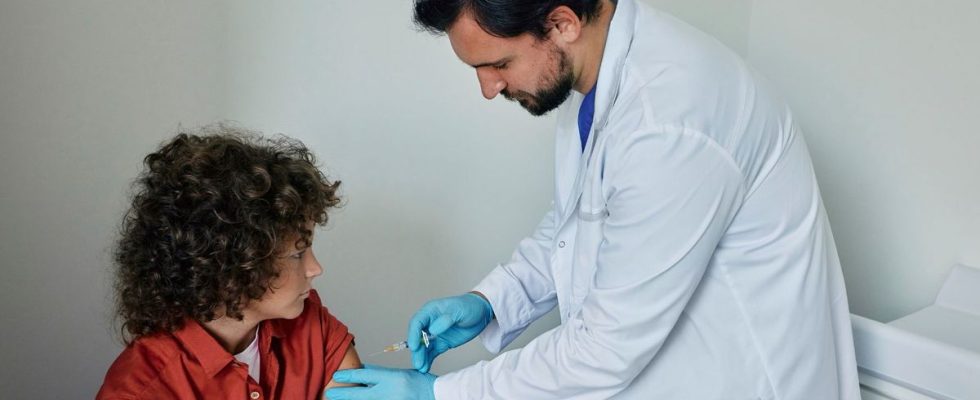For a long time, the papillomavirus spread silently in France. Since 2006 and the marketing of a vaccine, HPV – English abbreviation for “human papillomavirus” – are preventable. Despite everything, they continue to infect and kill many French women and men each year. They are thus responsible for more than 6,000 new cases of cancer per year and 1,100 deaths from cancer of the cervix. In the hope of stemming these contaminations, free vaccination of 5th graders will begin from October 1 in nearly 7,000 establishments, the Ministers of National Education and Health announced on Monday.
An emergency when France has one the lowest vaccination coverage in industrialized countries. At the end of 2022, only 48% of girls and 13% of 15-year-old boys had received at least one dose of vaccine in France. In Australia, 67% of adolescent boys and 78% of adolescent girls aged 15 received their three doses. “There is a huge delay in France on vaccination against the papillomavirus when one in five men in the world is a carrier of high-risk HPV and the vaccine is the only prevention tool”, recalls Lydie Porée, member of the family planning office, in charge of advocacy on the fight against HIV and sexually transmitted infections.
A vaccine presented as female
The papillomavirus is the leading cause of uterine cancer, with approximately 3,000 cases per year, but it also affects men with anal, penile and ENT cancers. For a long time, vaccination against the papillomavirus was presented as the ultimate “weapon” against cancer of the cervix. Forgetting, in passing, the other risks surrounding HPV. “I knew it existed for girls because they were more at risk, but before my doctor told me about it, I didn’t know that boys were allowed to be vaccinated,” explains Alex Merillou. The young man of 20 years was vaccinated last year, on the edge of the razor.
“I was convinced that I had no right to do so,” adds the young man. Because the vaccine against the papillomavirus sees its image of preventive treatment “for girls” sticking to its skin. Not surprising when you know that in France, vaccination has been recommended for the latter since 2007 but that the boys had to wait another fifteen years to be included. “This vaccine is essential for both girls and boys,” says Leslie Fonquerne, population health research engineer and gender and health sociologist. Beyond cancers, which are rarer in boys, HPVs lead to other conditions such as anogenital warts. However, among the 100,000 detected each year, half concern men.
Men kept away from health and sexual health
“Society acts as if men had no bodies, as if responsibility for their health was not theirs. It is so entrenched that it becomes counterproductive for their own health,” denounces Lydie Porée. “When an issue is related to sexual and reproductive health, women are always empowered. For their part, the boys are not encouraged to consult in general, even less on the questions of sexual health ”, abounds Leslie Fonquerne. She explains that the statistics show a large gap in medical consultations between men and women, which turns into a real gap when it comes to sexual health. Most women consult their gynecologist from adolescence while “when men consult in the field of andrology, it is generally rather towards the end of life”, she notes.
By vaccinating boys more systematically with the papillomavirus, we therefore allow them to protect themselves but also to protect their future sexual partners, because many men are asymptotic carriers and can contaminate their partners. Getting vaccinated to protect future partners was not very convincing a few years ago. However, “we are witnessing a change in society, even if it is slow”, welcomes Lydie Porée. It is above all to protect his “future partners” that Alex Merillou chose the injection. The young man also regrets the lack of information on this subject and encourages high schools and especially colleges to do “more prevention”.
“I was lucky enough to be able to do it at the very last limit because my doctor told me about it. I then discussed it with my entourage and many of my friends had never heard of it. And it was unfortunately too late for them,” he explains. The French health authorities indeed recommend the injection of two doses between 11 and 14 years of age or three catch-up doses in unvaccinated young people aged 15 to 19 years of age.
“Debinarizing Sexual Health”
“In France, it is still difficult to mobilize boys and men on issues of sexual health. In broader health policies, for example contraception, women are very empowered in our country whereas it is more balanced in Australia”, explains Leslie Fonquerne. However, the country of Oceania is on the way to eradicating cancer of the cervix thanks to its vaccination campaigns which quickly integrated boys. To achieve the same result, better information is needed. “The lack of information on the papillomavirus raises questions about sex education. The law [qui prévoit trois séances annuelles obligatoires] is not respected, which poses a risk to people’s health”, criticizes Lydie Porée. Only 15% of young people benefit from these three sessions a year during their secondary education, according to SOS Homophobia.
And when it comes to HPV, the silence is even more deafening for boys. “In college and high school, we were told about AIDS and condoms. But never from these diseases, ”regrets Alex Merillou. However, the condom does not protect against HPV. In these sessions, boys and girls are often separated, and as many people continue to view HPV as a vector of uterine cancer only, it is less likely to be presented in a single-sex session. . “We must debinarize sexual health, it’s not just a woman’s affair”, calls Lydie Porée. “Today, it’s not just the woman who has to protect herself, it’s done by two. And this path also begins with vaccination,” concludes Alex Merillou.

